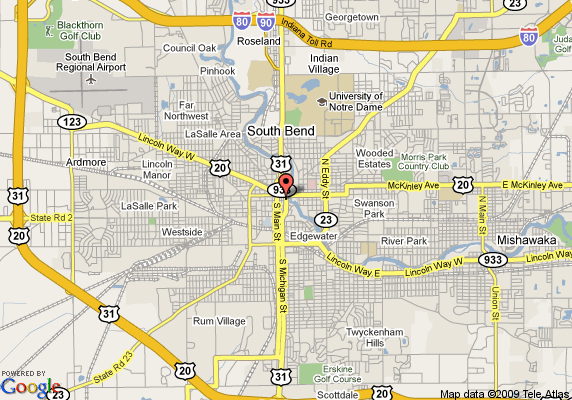The South Bend housing market is polarizing to say the least. Home prices have made up a lot of ground since the recession, and the return of equity is having a positive impact. The evidence is hard to look past, as the appreciation rates in South Bend are some of the highest in the country. However, local economic indicators are doing nothing to help. For the South Bend real estate market to realize its true potential, it needs to improve its job sector.
Homes in the South Bend real estate market have continued to exhibit signs of growth. For three consecutive years, gains have remained consistent, and prices are growing relative to last year. At $102,100; home values in South Bend are well below the national average. However, the South Bend housing market has benefited from some of the country’s highest appreciation rates. No more than five months ago, South Bend real estate had the sharpest increase in home vales at 26.8 percent. Only Las Vegas, NV and Naples, FL were even close. While appreciation has tempered, today’s rates are just under 20 percent. The national average, on the other hand, is around 6.7 percent.
The following highlights how much equity has been gained in South Bend relative to the year of the home’s purchase:
- Homes purchased in the South Bend housing market one year ago have appreciated, on average, by $17,695. The national average was $15,753 over the same period.
- Homes purchased in the South Bend housing market three years ago have appreciated, on average, by $36,220. The national average was $53,565 over the same period.
- Homes purchased in the South Bend housing market five years ago have appreciated, on average, by $37,805. The national average was $47,444 over the same period.
- Homes purchased in the South Bend housing market seven years ago have appreciated, on average, by $29,063. The national average was $17,200 over the same period.
- Homes purchased in the South Bend housing market nine years ago have appreciated, on average, by $30,659. The national average actually decreased $100 over the same period.
South Bend’s economy is unique, in that it is largely the result of a nearby school. South Bend is home to Notre Dame, a Catholic University as rich in tradition as it is in its pocketbooks. Fortunately, for the South Bend housing market, Notre Dame has taken an interest in the city. The university is now working directly with the city to channel more investment into the area. If that wasn’t enough, Notre Dame is now South Bend’s top employer. The school is irrefutably an important cog in the machine that is South Bend.
Even with the help of Notre Dame, South Bend could look to improve its economic indicators. The city’s unemployment lags behind the national average, but has shown signs of improvement. It is now at 6 percent, having dropped 1.5 percent in the last year. Unfortunately, even with the jobs that the university supplies, local employment growth is slow and needs to improve if it is to help the South Bend housing market.
South Bend real estate is more affordable than most markets across the country. Moreover, affordability is historically strong. Homeowners spend an average of 5.6 percent of their income on monthly mortgage payments. The same ratio for the rest of the country is about 14.3 percent.
With appreciation rates still high and affordability being what it is, South Bend real estate investing should see a lot of activity. However, more opportunities may be found in the distressed sector. RealtyTrac has identified 373 homes that are currently in some state of foreclosure – most of which should provide investors with intriguing options. That number is actually 43 percent lower than this time last year.
Of the distressed properties in today’s market, 86.8 percent are scheduled to be placed up for auction. As high as that may seem, auction sales are actually down 27 percent from last year. The remaining distressed properties are all bank-owned, meaning they are a viable option to anyone interested in South Bend real estate investing. In fact, these properties may offer some of the best spreads, and should be considered.
The percent of delinquent mortgages, or those that have fallen behind on payments, in the South Bend housing market is 6.1 percent, which is lower than the national value of 6.3 percent. Fortunately for homeowners, appreciation rates should help in the coming months.
According to Trulia, the South Bend housing market has approximately 1,117 resale and new homes for sale – nine of which are hosting open houses. The average listing price for these properties was $123,163, which represents a decrease of 2.6 percent, or $3,267, compared to the week prior. The most popular neighborhoods, according to Trulia, are Northeast and River Park, with respective listing prices of $113,375 and $77,064. However, the following neighborhoods have also received a lot of attention, and should therefore be considered by South Bend real estate investors:
- Harters Heights
- Near Northwest
- Twyckenham Hills
Each of these neighborhoods has recently demonstrated an increased propensity towards week-over-week price gains.
In the next year, Zillow predicts that South Bend real estate will be the beneficiary of a 1.3 percent increase in home values.
Again, the South Bend real estate market has experienced some of the highest appreciation rates. Nonetheless, the city is still one of the most affordable in the country. While it has a ways to go, things are definitely trending in the right direction.
South Bend Housing Market Summary:
- Current Median Home Price: $102,100
- 1-Year Appreciation Rate: 19.1%
- Unemployment Rate: 6%
- 1-Year Job Growth Rate: 1.7%
- Population: 102,073
- Median Household Income: $34,761

